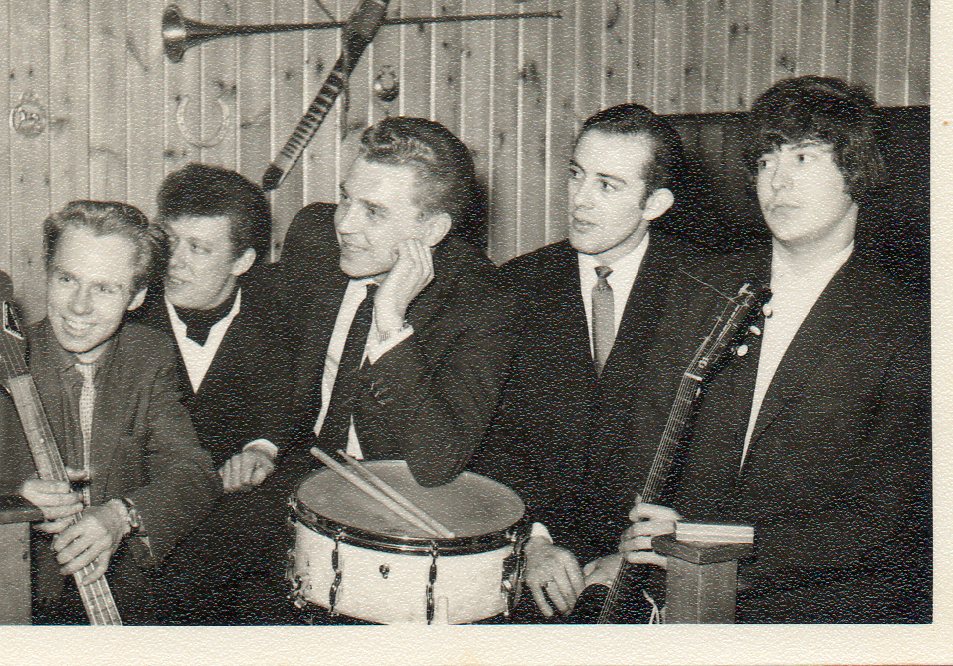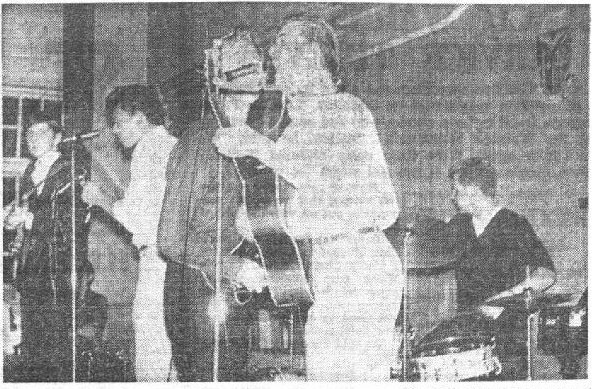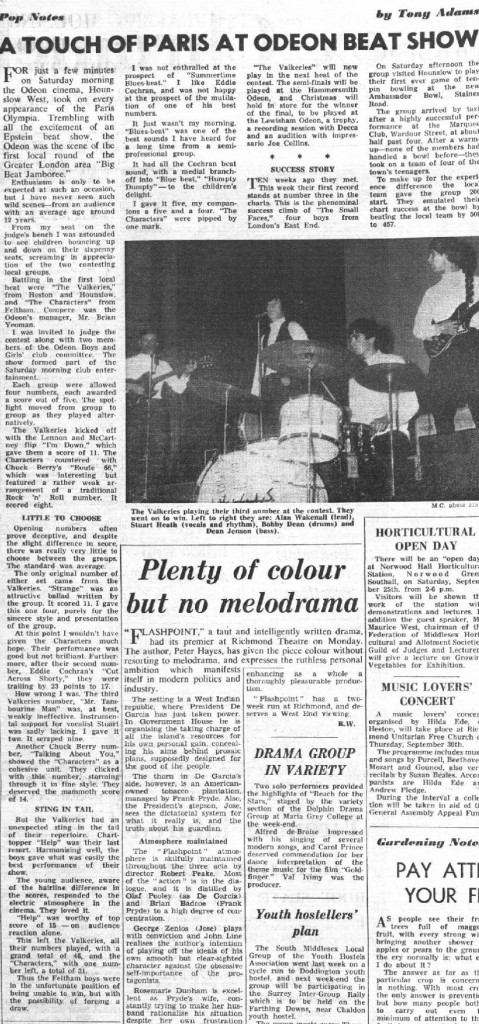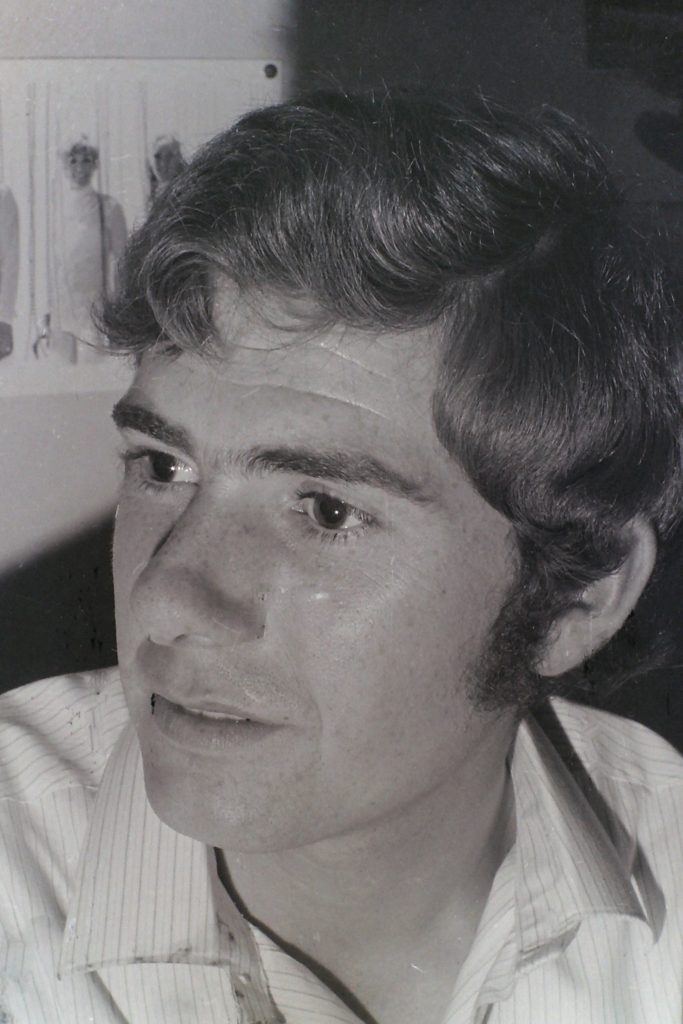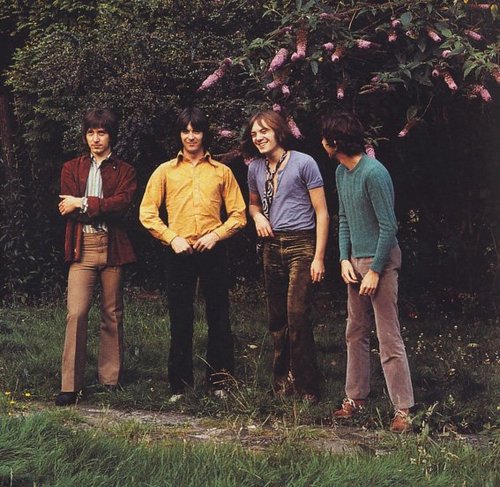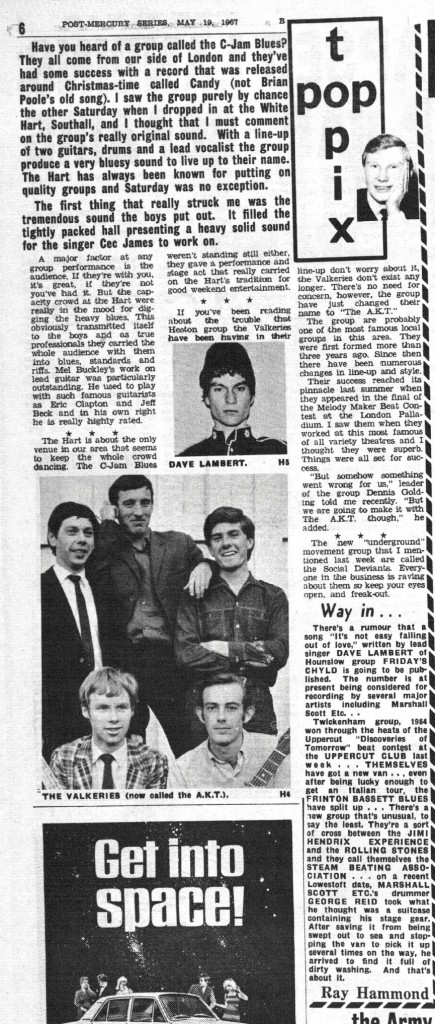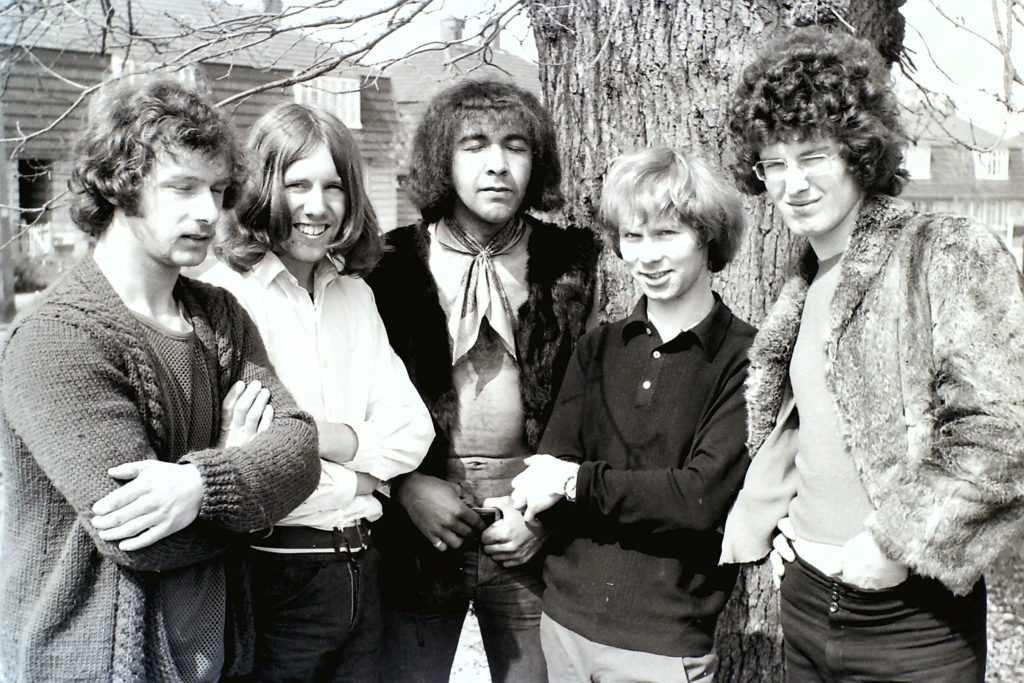By Nick Warburton
An obscure West London band from the Heston and Hounslow areas of west London, The Valkeries featured a number of talented musicians who went on to collectable recording groups in later years.
The Valkeries Mid 1965, left to right. Dennis Golding, Barney Barnes, Ken Fisher, Alan Wakenell, Stuart Heath (photo from Alan Wakenell)
Formed in early 1964, the original line up featured band leader and bass player Dennis Golding who remained with the band throughout The Valkeries’ career and lead guitarist Alan Wakenell.
Joined by drummer Ken Fisher (Golding’s cousin), and abetted by a fill-in singer, the group took its name from a poster depicting the Ride of The Valkeries and entered a local talent contest. Not long after, the trio added a permanent singer – Derek “Barney” Barnes.
The late Barney J Barnes, as he would later be known, first came to prominence in 1958 when he appeared on BBC TV’s Six-Five Special, performing with Hounslow skiffle group The Alleykats. When that band broke up around 1959, Barnes sang with a couple of other local groups before becoming front man for The Valkeries.
During the summer of 1964, The Valkeries expanded the line up by taking on rhythm guitarist Dave Caralambous (aka Dave Carol), former lead guitarist with The Smokestacks, who had been house band at the 51 Club in London.
Much younger than the other members, Carol had started in The Drovers around 1962 with future Others and Calum Bryce drummer Geoff Coxon and rhythm guitarist Richard Allen.
The Valkeries at Hounslow Town Hall – October 1964 (left to right, Dave Caralambous, Barney Barnes, Dennis Golding, Alan Wakenell and Ken Fisher)
Sometime in 1963, they became The Smokestacks when lead singer Mike Smith joined (and Brian Hosking from The Legend subbed on bass) and appeared at a number of notable local venues, not least the famous Eel Pie Island.
However, in January 1965, Dave Carol departed to join Jeff Curtis & The Flames, which later morphed into The Kool and recorded for CBS. Rhythm guitarist Stuart Heath took his place.
The band then carried on for a few more months before Ken Fisher also departed, followed soon after by Barney J Barnes.
While Fisher would drop out of the music scene, Barnes would emerge as frontman with The Trendbender Band, which morphed into Barney J Barnes & The Intro in the summer of 1967 (see Strange Brew piece: http://thestrangebrew.co.uk/articles/barney-j-barnes-and-the-intro).
Left with the band’s name, remaining members Alan Wakenell, Dennis Golding (who briefly took on the stage name Dean Jenson) and Stuart Heath brought in Bobby Dean on drums.
Dean had previously been a member of another local band The Stringbeats with lead singer Ian Pitwell (later in The Dae-b-Four and The All Night Workers), guitarist Gerry Light, bass player Dave Williams and rhythm guitarist Colin Layton.
The Hounslow Edition of the Middlesex Chronicle ran an expose on the new line up in its 17 September 1965 issue when The Valkeries participated in the first local round of the Greater London area “Big Beat Jamboree”.
With Heath now handling lead vocals, the review reveals that the band had moved away from its R&B repertoire towards a more folk-rock direction with covers of The Beatles’ “Help” and Bob Dylan’s “Mr Tambourine Man” among others, as well as introducing the original, band composition – “Strange”.
The Valkeries, The Middlesex Chronicle (Hounslow Edition), 17 September 1965
The new line up also entered the Melody Maker beat competition and reached the finals, which were held at the London Palladium. The Eyes of Blue won the competition and The Valkeries came fourth.
On 2 October 1965, The Valkeries played at the Cellar in Kingston upon Thames, southwest London; a venue that they had played at the previous month on 11 September.
The Hounslow edition of the Middlesex Chronicle advertised another gig at Hounslow Town Hall on 5 February 1966, by which time Stuart Heath had departed to be replaced by Ken Ferris on rhythm guitar and Dave Lamb on vocals.
Dave Lamb (photo from Dave Lamb)
Three months later Bobby Dean became the latest casualty. According to the 2 September 1966 issue of the Middlesex Chronicle, the drummer went on to play in a very short-lived backing band supporting Patrick Lyons and Chris Thomas (both ex-Second Thoughts) as Hat & Tie. He subsequently died in later years.
Profiled in the 17 June 1966 issue of the Middlesex Chronicle, The Valkeries’ new drummer was Mick Carpenter, who had previously recorded with Twickenham band The Muleskinners alongside singer Terry Brennan, bass player Pete Brown, lead guitarist Dave Pether, harmonica player Nick Tweddell and most significant of all, future Small Faces keyboard player Ian McLagan (http://davidwills.wordpress.com/2009/11/15/muleskinners-got-them-hounslow-blues-again).
Ian McLagan (second left) and the Small Faces
This new version of The Valkeries gained a place in the semi-finals of the Melody Maker national beat contest, held at the Regent Ballroom in Brighton on 10 July 1966.
The band continued to gig locally but in May 1967, the Hounslow, Brentford and Chiswick Post reported that The Valkeries had changed name to The AKT (aka Always Killing Time).
Wakenell, however, says that he left just before the name change and emigrated to New Zealand in late 1969 where he later started the Association of New Zealand Barbershop Singers.
Subsequent issues of Hounslow, Brentford and Chiswick Post reveal that the group’s line up remained unsettled; the 23 June 1967 edition notes that The AKT was reforming after David Lamb had left.
Judging by the 22 September 1967 issue, it looks like Mick Carpenter had also departed because former Valkeries drummer Bobby Dean, who had worked with Hat & Tie in the interim was helping out. This line up gigged with Sounds Incorporated and apparently recorded two original tracks in October 1967.
The final Valkeries line up in early 1967 before they changed name to The AKT. Bottom left: Dennis Golding, bottom right: Alan Wakenell; Standing left to right: Ken Ferris, Mick Carpenter and David Lamb (The Hounslow Post May 1967)
Dean, however, doesn’t appear to have stayed around very long and went onto form his own outfit, Bobby Dean’s Chasers before attempting to form a new band with Riot Squad members Caldwell Smythe and Pete Dunn, which never got off the ground.
Golding confirms that The AKT name never took off, so in late 1968, the group reverted back to The Valkeries by which point, the line-up also included singer Dennis Miles; keyboard player Neil Regent; drummer Dennis Taylor; and a guitarist called Dennis.
“We used to rehearse in Twyford near Reading and got to know Roger Daltrey of The Who,” says Golding.
“He recorded some of our songs in his house – we were in the lounge and he was in his studio in another room. One evening he played us a new song that Pete Townshend had written to see what we thought. Pete used to play all the instruments when he did this to give a flavour of the song. We were reasonably keen about the song as well we should have been – it was called ‘Pinball Wizard’.”
The Valkeries – Dennis, Neil Regent, Dennis Miles, Dennis Golding and Dennis Taylor
The Valkeries later played at the London Palladium on a bill that also featured Long John Baldry and The Barron Knights.
However, Golding adds that the band stopped working around 1970 due mainly to an “agent” and financier who insisted that the musicians practise until they were perfect before he’d find them any gigs!
When The Valkeries split, Golding joined The Tony Dee Band, which had originally featured Rick Wakeman in its ranks. During the 1970s, Golding joined 12-piece outfit, Juvessance. However, he later dropped out of the music industry and nowadays works as a musical director and church organist.
Many thanks to Alan Wakenell, Dennis Golding and Dave Caralambous for their input.
